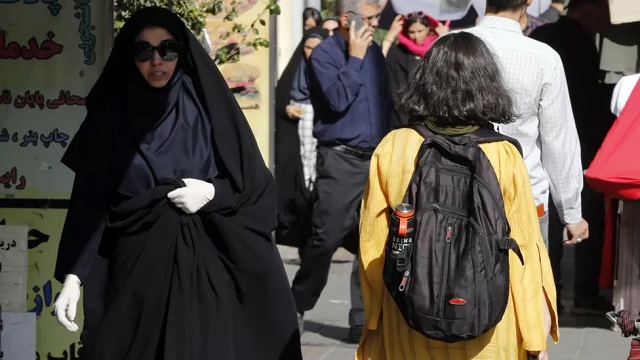
Iran’s parliament has passed a controversial bill that would increase prison terms and fines for women and girls who break its strict dress code.
Those dressed “inappropriately” face up to 10 years in jail under the bill, for which a three-year “trial” was agreed.
It still needs to be approved by the Guardian Council to become law.
The move comes a year after protests erupted over the death in custody of Mahsa Amini, who was held by morality police for an allegedly improper hijab.
Women burnt their headscarves or waved them in the air at the nationwide demonstrations against the clerical establishment, during which hundreds of people were reportedly killed in a crackdown by security forces.
A growing number of women and girls have stopped covering their hair in public altogether as the unrest has subsided, despite the return of the morality police to the streets and the installation of surveillance cameras.
Under Iranian law, which is based on the country’s interpretation of Sharia, women and girls above the age of puberty must cover their hair with a hijab and wear long, loose-fitting clothing to disguise their figures.
Currently, those not complying risk a prison term of between 10 days and two months or a fine of between 5,000 and 500,000 rials ($0.10-$10.14 at the black market exchange rate).
On Wednesday, members of parliament voted by 152 to 34 to pass the “Hijab and Chastity Bill”, which says people who are caught dressed “inappropriately” in public places will be subject to a “fourth degree” punishment.
According to the penal code, that means a prison sentence of between five and 10 years and a fine of between 180m and 360m rials ($3,651-$7,302).
The bill also proposes fines for those “promoting nudity” or “making fun of the hijab” in the media and on social networks, and for owners of vehicles in which a female driver or passenger is not wearing the hijab or appropriate clothing, according to AFP news agency.
Any person who promotes violating the dress code “in an organised manner” or “in co-operation with foreign or hostile governments, media, groups or organisations” could also be imprisoned for between five and 10 years, it says.
The bill will now be sent for approval by the Guardian Council, a conservative body of clerics and jurists. They have the power to veto the bill if they consider it inconsistent with the constitution and Sharia.
Earlier this month, eight independent UN human rights experts warned the bill “could be described as a form of gender apartheid, as authorities appear to be governing through systemic discrimination with the intention of suppressing women and girls into total submission”.
“The draft law imposes severe punishments on women and girls for non-compliance which may lead to its violent enforcement,” the experts said.
“The bill also violates fundamental rights, including the right to take part in cultural life, the prohibition of gender discrimination, freedom of opinion and expression, the right to peaceful protest, and the right to access social, educational, and health services, and freedom of movement.”
Source: bbc.co.uk






Be the first to comment